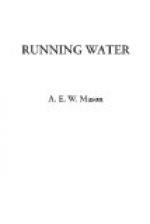Sylvia began to dilate upon its ill-effects, and suddenly broke off. A great disgust was within her and stopped her speech. She got to her feet. “Let us go home,” she said, and she went very quickly down the hill. When she came to the house she ran up-stairs to her room, locked the door and flung herself upon her bed. Walter Hine, her father, their plots and intrigues, were swept clean from her mind as of no account. Her struggle for the mastery became unimportant in her thoughts—a folly, a waste. For what her father had said was true; she cared for Chayne. And what she herself had said to Chayne when first he came to the House of the Running Water was no less true. “If I loved, I think nothing else would count at all except that I loved.”
She had judged herself aright. She knew that, as she lay prone upon her bed, plunged in misery, while the birds called upon the boughs in the garden and the mill stream filled the room with its leaping music. In a few minutes a servant knocked upon the door and told her that tea was ready in the library; but she returned no answer. And in a few minutes more—or so it seemed, but meanwhile the dusk had come—there came another knock and she was told that dinner had been served. But to that message again she returned no answer. The noises of the busy day ceased in the fields, the birds were hushed upon the branches, quiet and darkness took and refreshed the world. Only the throbbing music of the stream beat upon the ears, and beat with a louder significance, since all else was still. Sylvia lay staring wide-eyed into the darkness. To the murmur of this music, in perhaps this very room, she had been born. “Why,” she asked piteously, “why?” Of what use was it that she must suffer?
Of all the bad hours of her life, these were the worst. For the yearning for happiness and love throbbed and cried at her heart, louder and louder, just as the music of the stream swelled to importance with the coming of the night. And she learned that she had had both love and happiness within her grasp and that she had thrown them away for a shadow. She thought of the letter which she had written, recalling its phrases with a sinking heart.
“No man could forgive them. I must have been mad,” she said, and she huddled herself upon her bed and wept aloud.
She ran over in her mind the conversations which she and Hilary Chayne had exchanged, and each recollection accused her of impatience and paid a tribute to his gentleness. On the very first day he had asked her to go with him and her heart cried out now:
“Why didn’t I go?”
He had been faithful and loyal ever since, and she had called his faithfulness importunity and his loyalty a humiliation. She struck a match and looked at her watch and by habit wound it up. And she drearily wondered on how many, many nights she would have to wind it up and speculate in ignorance what he, her lover, was doing and in what corner of the world, before the end of her days was reached. What would become of her? she asked. And she raised the corner of a curtain and glanced at the bright picture of what might have been. And glancing at it, the demand for happiness raised her in revolt.




